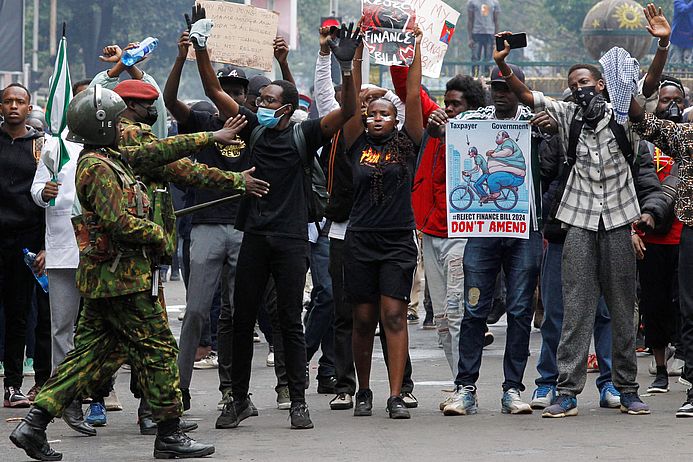By Radwa Khaled-Ibrahim
Social protests are not uncommon in Kenya. The current wave of protests, most recently triggered by a planned tax reform, began around two years ago. At its heart is a question that Wanjira Wanjiru from the medico partner organisation Mathare Social Justice Center asked back in 2023: "Whose interests is our government protecting? Our interests or the interests of the West?"
So far, the demonstrations have resulted in one parliament building being stormed by protesters and an officially recognised 24 deaths - a high number of unreported cases is suspected in human rights circles. Kenya's President Ruto rowed back last week and promised not to sign the reform. However, Dan Owalla from the medico partner organisation SODECA sees this as a "communicative trick": the only body that could withdraw the legislative package, the Kenyan parliament, is pausing until the end of July following a presidential decree. This means that the 21 days in which the law requires the president's signature will expire. Parliament would have to withdraw its consent within this period, but the pause means that the law will automatically come into force, with or without Ruto's signature.
However, something is actually new about the current protests: ethnic, political, social or generational differences do not play a role. The discontent runs right across society. It does not have a unified identity, but countless faces."The people united, cannot be defeated" reads one banner.
The demonstrations, most of which are mobilised via social media and without a leader, are not only larger and more radical than previous protests.The protests, dominated by the so-called Generation Z, are also 'going all out'. They are questioning the system, both locally and globally. On the one hand, they are defending the Kenyan constitution against the government; on the other, they are demanding a world order in which all people enjoy the same rights and which is not based on colonial continuities.
Despite its continued influence, the West has long felt threatened by China and Russia in Africa. This is no coincidence. The Sahel region and large parts of West Africa have turned their backs on the West and moved towards Russia.South Africa is challenging the moral sovereignty of the West before the International Court of Justice with its lawsuit against Israel, while proxy wars between national and foreign, including Western, powers are raging in Sudan and the DR Congo. In North and East Africa, the West is competing with regional and global superpowers. The conflict scenario has taken on a life of its own and the West is losing its supremacy. The following quote, attributed to a Kenyan politician, can also be understood in this way: "Every time China visits us we get a hospital; every time Britain visits us we get a lecture". Recently, there have been other options than the West.
Kenya has so far been an anchor of Western interests on the African continent. To prevent it from drifting away and turning to other powers, the West is increasing its influence on Kenya's economic policy. Dan Owalla describes the stronger ties to the West as "neo-neo-colonisation" through debt, which goes hand in hand with devastating structural adjustment programmes; through exploitative economic agreements that only benefit the country's elite and harm regional integration; or through investments that only play into the hands of certain social groups.
The current protests have long been about more than just tax reform and an empty announcement by the president will not be able to put an end to them any time soon.The West and its influence on Kenya, especially through its institutions such as the International Monetary Fund and the World Bank, are also being addressed. These are no longer in keeping with the times, as they not only cost human lives on a continuous basis, but in the midst of geopolitical power shifts, they no longer even serve the purpose of safeguarding the interests and weight of the West. The protesters' demand is clear: this economic project is no longer negotiable – they are standing for it with their lives.

